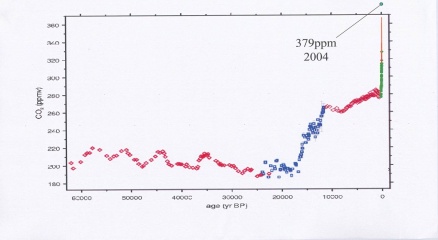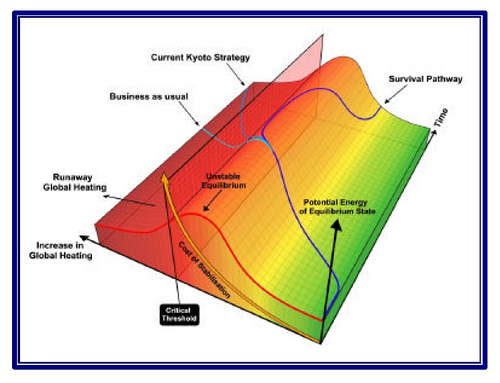Difference between revisions of "Climate Portal"
Miriam Rose (talk | contribs) |
Miriam Rose (talk | contribs) |
||
| Line 68: | Line 68: | ||
|style="color:#000;"| | |style="color:#000;"| | ||
| − | COP15 is the popular name for a conference that | + | COP15 is the popular name for a conference that took place under the general framework of the United Nations Climate Change Conference 2009, 7–18 December at the Bella Center, Copenhagen, Denmark. This conference represents the 15th Conference of the Parties – hence the name – to the United Nations Framework Conventions on Climate Change. Copenhagen 2009 included the 5th Meeting of the Parties (COP/MOP5) to the Kyoto Protocol. |
| − | The conference | + | The conference was significant as it was scheduled to come up with the next binding agreement after the first stage of the Kyoto protocol expires in 2012. Environmentalists put pressure on governments to achieve tough and legally binding carbon descent targets, highlighting the ineffectiveness of the Kyoto targets, which are far from being met by most states. COP15 is also being hailed as historically important as the ultimate failure of the conference to reach an effective agreement is seen by some to signify the end of hope in top-down government and business led climate change strategy. |
| + | |||
| + | The increase in public denial and disillusionment about climate change in Britain may also be seen as a manifestation of hopelessness and apathy about finding solutions to the issue, perpetuated by ineffective government strategies, which have historically targeted individual behaviour over polluting industry. Only 41% of those surveyed by a recent Times newspaper poll believed climate change was anthropogenic (man made) despite established science to the contrary. <ref>Ben Webster and Peter Liddell, The Times, November 14,2009. 'Global warming is not our fault, say most voters in Times poll'</ref> | ||
The graph below shows the path of current Kyoto strategy which takes us over the red tipping point (using IPCC's most recent reports) and into 'runaway' or unstoppable climate change (caused by a number of natural knock on effects or 'positive feedbacks' which kick in once a certain carbon concentration is reached). The action needed to address this devastating threat is rapid carbon descent, translating into deep cuts in the activities of carbon heavy industries and energy production, and a matching decrease in consumption. Despite this, in mid November 2009 President Obama and other world leaders announced their plan to delay any agreement until after the Copenhagen summit, pushing urgent issues into the future.<ref>Helene Cooper, The New York Times, 14th Nov 2009. 'Leaders Will Delay Deal on Climate Change'</ref> | The graph below shows the path of current Kyoto strategy which takes us over the red tipping point (using IPCC's most recent reports) and into 'runaway' or unstoppable climate change (caused by a number of natural knock on effects or 'positive feedbacks' which kick in once a certain carbon concentration is reached). The action needed to address this devastating threat is rapid carbon descent, translating into deep cuts in the activities of carbon heavy industries and energy production, and a matching decrease in consumption. Despite this, in mid November 2009 President Obama and other world leaders announced their plan to delay any agreement until after the Copenhagen summit, pushing urgent issues into the future.<ref>Helene Cooper, The New York Times, 14th Nov 2009. 'Leaders Will Delay Deal on Climate Change'</ref> | ||
| Line 76: | Line 78: | ||
[[Image:2246714022 dea81182df.jpg|centre|Tipping points and climate policy trajectory: A case for rapid carbon descent.]] | [[Image:2246714022 dea81182df.jpg|centre|Tipping points and climate policy trajectory: A case for rapid carbon descent.]] | ||
| − | |||
| − | |||
Revision as of 12:33, 14 January 2010
Welcome to the Climate Portal on Spinprofiles | |||
|---|---|---|---|
|
|
|
References
- ↑ IPCC, Climate Change 2007: Synthesis Report, accessed 11th September 2009
- ↑ IPCC, Climate Change 2007: Synthesis Report, accessed 11th September 2009
- ↑ IPCC, Climate Change 2007: Synthesis Report, accessed 11th September 2009
- ↑ Ben Webster and Peter Liddell, The Times, November 14,2009. 'Global warming is not our fault, say most voters in Times poll'
- ↑ Helene Cooper, The New York Times, 14th Nov 2009. 'Leaders Will Delay Deal on Climate Change'


